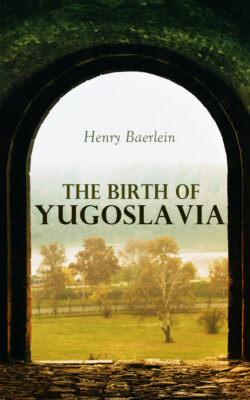Читать книгу The Birth of Yugoslavia - Henry Baerlein - Страница 90
На сайте Литреса книга снята с продажи.
THE YUGOSLAV NAME
ОглавлениеMiss Muir Mackenzie's other letter, of June 23, is addressed to Rakovski from Bolsover Castle, Chesterfield. It is written in French. "We attach great importance," she says, "to the name Yugoslav. By means of crying that word in the ears of the Greeks one will succeed in making them understand that the Bulgars are Slavs. By means of crying it in the ears of the European diplomats one will succeed by making them comprehend that one cannot ignore a people of ten or twelve million souls. By means of crying 'We are Yugoslavs,' the Yugoslavs themselves will succeed in forgetting their little distinctions of environment and race, and in conducting themselves as a nation worthy of the name. Let us therefore cry that word—we will make people speak of it sooner or later."
In June 1863 Rakovski was at Cetinje, but as he was requesting subsidies he did not find a very sympathetic audience in Nikita. Thence he passed to Bucharest, where he issued—for ten numbers—a Bulgaro-Roumanian newspaper; the Bulgars in Bucharest had grown too prosperous to be interested either in his journalistic or his military schemes, and he found the Bulgarian colonies in Russia equally obtuse. He was attacked by consumption while he was at work upon the Provisional Law for the National Bands in the Forests—a sort of written constitution for the heiduks, and in the intervals of his last sufferings he wrote a history of the heiduks from the days of the Turkish conquest. He died on October 20, 1867.
The statesmen who then governed the Great Powers may have deprecated Rakovski as much as he deprecated them. It must have been exasperating for those solid persons subsequently to acknowledge—if they did so—that this unbalanced agitator weighed them very well. But the Balkan countries were too weak; they had to suffer being thrown aside, pushed here and there, and trampled on; for when the Great Powers came down to the Balkans they could really not pay much attention to the little peoples of the country and at the same time keep their eyes upon each other. Afterwards the Balkan countries found that it was better for them when the Great Powers fought each other there than when they came to friendly understandings. It was profitable and diverting for Albania when the Austrians and the Italians glowered at each other in that silent land: it was terrible in 1878 for Bosnia and Herzegovina when the Great Powers were on such good terms with one another that they allowed one of themselves to make off with those two waifs of whom he was not even the wicked uncle.
Russia had been taking a keen interest in the Balkans after Austria's disaster in 1859 at Sadowa. It was then that Prince Gortchakoff and his colleagues in the Ministry were inspired by the doctrines of Katkoff, who in his Moscow Gazette exercised much authority over public opinion and even over the Tzar. Panslavism, according to Debidour,[49] which a short time ago had been shivering in the background, lifted its head proudly and spoke of the new era which holy Russia was about to inaugurate, of the sacred mission that was incumbent on the Tzar. And the sanctity was greater in that it was not to be defined by merely mediæval but by modern language; the Tzar must not alone protect all those who practised his religion, he must be a patron saint who patronizes.
